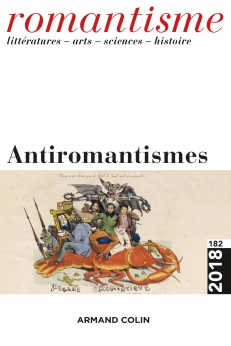
ROMANTISME N° 182 (4/2018)
Pour acheter ce numéro, contactez-nous
Recevez les numéros de l'année en cours et accédez à l'intégralité des articles en ligne.
Le débat politique récurrent sur le romantisme allemand porte en particulier sur la filiation romantisme-nazisme, une tradition critique française voyant dans ce romantisme un courant opposé à 1789, avec changement de paradigme, au tournant du XVIIIe au XIXe siècle, d’une référence encore antiquisante, « éclairée » et jacobine à une référence désormais médiévisante, catholicisante et réactionnaire. De la centralité du Sujet kantien à la souveraineté du Moi fichtéen, le romantisme allemand emprunte beaucoup à un idéalisme philosophique auquel s’oppose l’affirmation hégélienne de l’unité dialectique du réel et du rationnel, d’où la critique de la vacuité du romantisme ironique et cynique. Au-delà de Hegel, certains hégéliens critiques (Heine, puis plus encore Ruge) radicalisent la critique hégélienne du romantisme, Ruge déplaçant même le débat sur la rémanence du romantisme chez un Heine tout aussi « déchiré » que son époque.
The recurring debate regarding German romanticism concerns in particular the relationship between romanticism and Nazism, given that a tenet of a branch of French critical analysis sees in German romanticism opposition to 1789, with a change in paradigm, at the turn of the 18th century, from models taken from Antiquity, “enlightened” and radical in a Jacobin spirit, to models steeped in medievalism, Catholicism and of a reactionary spirit. From the idea of the centrality of a Kantian subject to the notion of the sovereignty of the Fichtean ego, German romanticism borrows a lot from an idealistic philosophy that the Hegelian assertion of the dialectical unity of the real and the rational opposes, which leads to the critique of the vacuity of the cynicism and irony of romanticism. Beyond Hegel, certain Hegelian scholars (Heine, and later even more so Ruge) radicalise the Hegelian critique of romanticism, Ruge going so far as to displace the debate regarding romanticism’s stubborn resurgence towards a Heine presented as as “ambivalent and torn” as his times.

